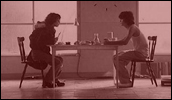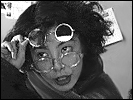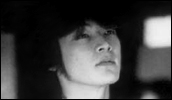Fried Dragon Fish
- Year
- 1993
- Original title
- Fried Dragon Fish
- Alternative title
- Thomas Earwing's Arowana
- Director
- Cast
- Running time
- 50 minutes
- Published
- 17 April 2001



by Jasper Sharp
Director Shunji Iwai has an awful lot in common with his American counterpart Quentin Tarantino. Both directors exploded upon the scene with their theatrical debuts in the early 90s (Tarantino with Reservoir Dogs in 1992 and Iwai with Love Letter in 1995); both followed their first films up with even bolder, idiosyncratic works which defined a new era of 'modern' cinema and set the benchmark for the films of the 90s (Tarantino with Pulp Fiction in 1994; Iwai with Swallowtail Butterfly in 1996). Both courted the media as 'celebrity' filmmakers and by the time both directors followed up their masterpieces (with Jackie Brown and April Story directed respectively in 1998), their work was already beginning to look dated and past its sell-by date. Consequently both directors seem to have kept a rather low profile ever since.
Like Tarantino, Iwai's films are prone to a slick stylistic glibness that caters squarely for the youth market - glossy exercises in pseudo-hip which though undeniably influential, a mere five years later already look passé. What once came across as fresh and experimental opened the floodgates for a deluge of emulators and detractors. In the case of poor Quentin it seemed that every film in the two years subsequent to Pulp Fiction featured quirky gangster caricatures strutting around in suits and shades through pointlessly tricksy non-linear narratives in films of such varying quality as The Usual Suspects (Bryan Singer, US 1995), Things to Do in Denver When You're Dead (Gary Fleder, 1995) and 2 Days in the Valley (John Herzfeld, 1996). Had Tarantino not been quite so eager to indulge his own acting fancies at the same time he might have ridden through the worst of the detritus that swished in his wake.
Likewise Iwai's personal style, wholeheartedly embracing MTV aesthetic of using heavily saturated colours, fast editing, and lengthy montages set to contemporary popular music, and casting his films with popular rock stars of the day (Japanese singer Chara features in both Swallowtail Butterfly and Picnic, Iwai's two 1996 films) has suffered because, well, most MTV videos from the mid-90s already look pretty dated too.
Ultimately it's true though that cinema in the early 90s, and certainly not just in Japan, desperately needed a kick up the arse to bring it in line with a new generation of viewers who had been brought up from day one being bombarded with images through the cathode ray tube. Its no surprise that Iwai cut his teeth in the media of TV advertisements and pop videos, nor that he defines himself as an 'eizo sakka', a visual artist who considers TV and video to be no different from feature film in either theory or practice. One of his first films, Fried Dragon Fish, highlights the point admirably. This 50-minute feature was originally made for television though was hoisted onto the cinemas screens of Japan subsequent to the cult success that greeted Swallowtail Butterfly.
Fried Dragon Fish is a shaggy dog story if ever there was one, a rather silly tale concerning the smuggling of the Arowana, the Red Dragon Fish whose value can reach up to several thousand dollars per fish. A girl named Pooh is the wise-cracking detective hired by fish-collecting fanatic Natsuro to track down the stolen fish. A cult film in certain circles in Japan, I have to be honest that this particular viewer didn't care for it too much.
For a director so concerned with 'images', the denouement here is essentially dialogue driven, with the more exciting plot turns which arise from Pooh's detective work consisting of shots of the protagonist fiddling around on a computer screen. It also feels hemmed in by the 4:3 aspect ratio, but these are both quibbles that are symptomatic of the title's small screen origins.
What is perhaps most striking is the sheer vacuity of the exercise. Sure, a lot of effort has been put into the look of the production, and its bold flashes of colour impress far more than anything else on offer. Pooh is introduced getting off a red scooter, her shocking pink helmet and techni-coloured scarf offset against the muted suburban background. Shots of the Arowana bobbing around its fish tank to a classical soundtrack abound whilst Natsuro admires from behind, bathed in blue light. But aside from such visual set decor, there's little to keep one's mind distracted from the hideous mugging of all the cast members (especially the American ones involved in this fishy scam), and the annoying 'cutesy' overacting from Yoshimoto as Pooh.
Its true, most of its supposed faults stem from the fact that Fried Dragon Fish was made for TV, but at the end of the day it is still a fairly minor offering. If you liked Iwai's later efforts this may well be worth sniffing out, but personally I thought this particular Dragon Fish was cod-awful.